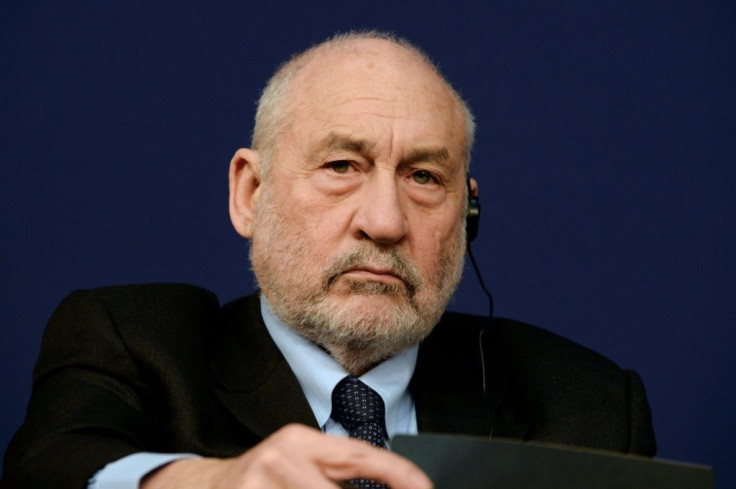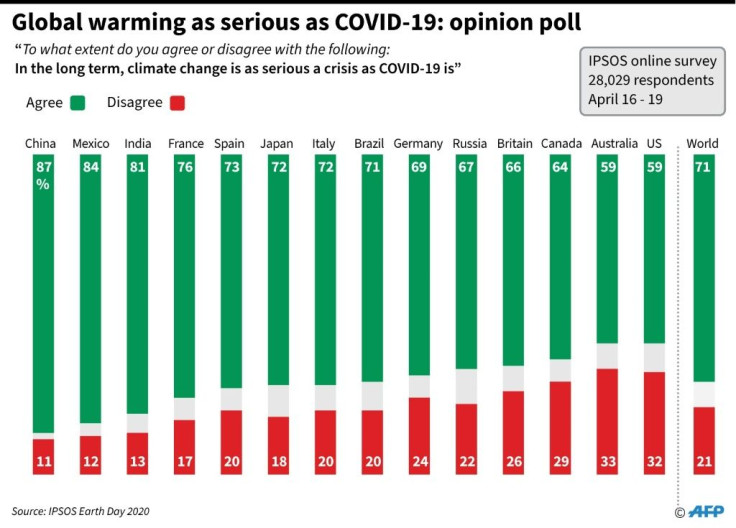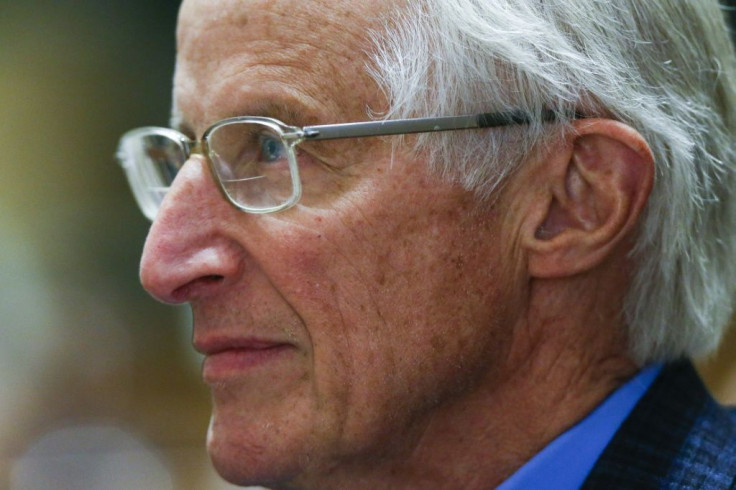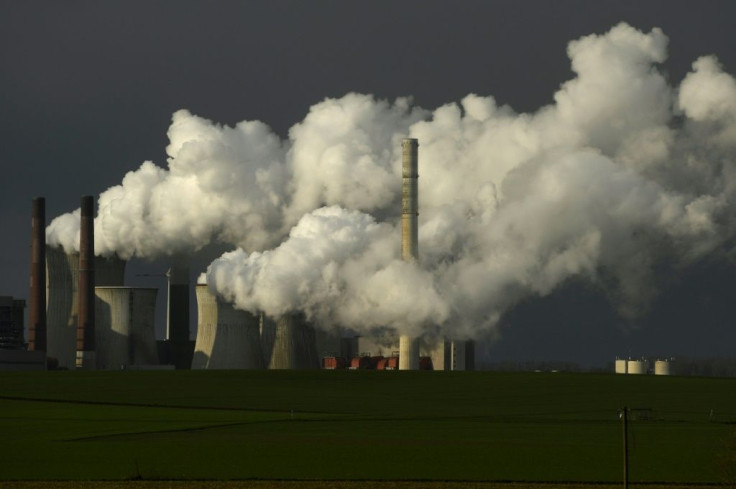Climate Economics Nobel May Do More Harm Than Good
There are many reasons humanity has failed to rein in climate change despite decades of dire warnings.
The inertia of an energy system overwhelmingly powered by oil, gas and coal; half-a-trillion dollars in fossil fuel subsidies every year; leaders too corrupt or feckless to push for systemic change; rich folk reluctant to consume differently, and poor folk eager to consume more -- all are huge obstacles to slowing, much less stopping, the global warming juggernaut.
Leading scientists and economists, however, say there is another impediment to climate action that merits closer scrutiny: the profoundly influential work of 2018 Nobel economics laureate William J. Nordhaus.
Nearly half-a-century ago, while other economists obsessed over resource scarcity, Nordhaus understood that environmental degradation was probably a greater long-term threat to economic growth. He predicted with uncanny accuracy the danger-zone levels of CO2 pollution we see today.
"I think of climate change as a menace to our planet and to our future," Nordhaus, an economics professor at Yale since 1974, said in collecting his profession's most coveted prize.
His ground-breaking 1991 study weighing the costs and benefits of reducing greenhouse gas emissions evolved into the standard toolbox for calculating the economic damages -- now and in the future -- of climate change.

It also established carbon taxes as a key policy lever for promoting green growth.
By the time, however, Nordhaus gave his acceptance speech in Stockholm, his models -- out of sync with both the galloping pace of global warming and new approaches in the field of economics -- were probably doing more harm than good, say experts.
Exhibit A is Nordhaus' conclusion that the cost -- measured in lost economic growth -- of capping global warming under three degrees Celsius overwhelms the benefits of avoided impacts.
"It is simply not aligned with climate science," said Johan Rockstrom, director of the Potsdam Institute for Climate Impact Research in Germany. "It is an unequivocal finding in the natural sciences that a 3C warming is a disastrous outcome for humanity," Rockstrom told AFP.
If climate scientists have long raised red flags about Nordhaus' work, criticism among economists -- with a few exceptions, such as the late Martin Weitzman of Harvard, another environmental economist -- has been more recent.
But no less categorical.
Nordhaus' model -- known as DICE, or Dynamic Integrated Model of Climate and the Economy -- "is so badly flawed that it shouldn't be taken seriously," Columbia University professor Joseph Stiglitz, who won an economics Nobel of his own in 2001, told AFP.

"In fact, it's dangerous because we don't have another planet we can go to if we mess this up. The message he's been conveying is foolhardy."
For Gernot Wagner, an economist at New York University who has spent much of the last decade forging an alternative approach to the economics of climate change, it is a matter of timing.
"If he had won the Nobel Prize 20 years ago, it would have helped climate policy," Wagner told AFP, adding that Nordhaus "absolutely" deserved the award.
"But the fact that he won it two years ago is, in many ways, a step back."
Experts interviewed by AFP outlined two core criticisms of Nordhaus' work, one ethical and the other from the perspective of Earth System scientists such as Rockstrom.

Nordhaus declined to "respond individually" to emailed questions detailing these critiques, which he said were "generally half-right".
"My main point is that -- outside of the European Union -- we have not taken even small steps to slow climate change in this century," he told AFP.
"We need national mechanisms (such as carbon taxes and support for technologies), and international cooperation (such as a carbon compact). That is where my efforts today are directed."
If disagreements over Nordhaus' signature accomplishments were no more than ivory tower squabbles, it wouldn't matter if his once pioneering ideas have slipped behind the curve.
The discussion, however, is anything but academic. Indeed, the stakes -- whether humanity thrives or merely survives -- could hardly be higher.
"What makes his contributions all the more notable is the deep influence they have had on policy -- something that cannot be said for every Nobel laureate," Yale economist Kenneth Gillingham, a Nordhaus co-author, said approvingly.
Nowhere is that influence more in evidence than with something called the "social cost of carbon", which quantifies the damages caused by global warming, and points to the policy actions -- namely, a price on carbon -- needed to curb emissions.

"If there's a holy grail of climate economic analysis -- a single number that attempts to summarise the immense complexities of climate change -- it's the 'social cost of carbon'," said Wagner.
Nordhaus was the first economist to apply a cost-benefit analysis to global warming by, in his words, "weighing the cost of reducing emissions and slowing climate change, on the one hand, with the reduction in damages, on the other."
How much, in other words, are we willing to pay today to avoid climate impacts 50, 100 or 200 years from now?
To make that calculation, Nordhaus needed to put a price on something that had never been given a dollar value: a tonne of CO2 pollution.
For Nordhaus, that magic number is about $40 a tonne, and should rise gradually over time as the global economy transitions from brown to green.

"It was crucial in determining the US social cost of carbon under Obama. This in turn was used, at least indirectly, as a benchmark for the US commitment under the Paris Climate Agreement and the Clean Power Plan," said Wagner.
But while Nordhaus is celebrated, even by his critics, for pioneering the concept, the way he applied it has been found wanting.
Determining the price of carbon pollution requires estimating how much damage climate change will do in the future, and to do that economists apply something called a discount rate to the impact of, say, sea level rise or more frequent heat waves 50 or 100 years from now.
The reasoning is straight-forward: assuming the global economy continues to grow, societies will be richer in the future and -- with better technology and more money -- can cope more easily with those impacts than today.
Economists using this classic approach commonly discount future damages by four or five percent, compounded annually.
But such a high rate, scientists and some economists say, vastly downplays the risk to future generations.
Let's say climate damages in 2120 are estimated at $2 trillion, and the annual investment needed today to avoid them is about one percent -- $860 billion -- of global GDP, as proposed by British economist Nicholas Stern in his landmark 2006 Stern Review.
If those future impacts are discounted at four to five percent per year, their "value" a century from now drops to $15-$39 billion -- 20-30 times less than the cost of avoiding them.
But if those same impacts are discounted at 0.5 percent instead, as recommended by Stern and others, the value of those damages a century from now exceed $1 trillion, making one percent of GDP a worthwhile investment.
Underestimating the costs of climate change means that "world leaders understand neither the magnitude of the risks to lives and livelihood, nor the urgency of action," Stern commented shortly after the 2018 Nobel were awarded.
For Michael Mann, director of the Earth System Science Center at Pennsylvania State University, Nordhaus' "heavy social discounting inappropriately down-weights devastating impacts that fall disproportionately on future generations, arguably violating basic ethical considerations".
Nordhaus' calculus also challenges a global political consensus that is already fraying at the edges.
The 2015 Paris climate treaty calls for holding the rise in temperature to "well below" 2C compared to preindustrial levels, and the UN's climate science panel (IPCC) subsequently concluded in a landmark report -- unveiled, ironically, on the same day that Nordhaus was awarded his Nobel -- that 1.5 C is a far safer guardrail.
His ideas "provide ammunition not only to climate sceptics, but to major actors that feel more comfortable with the status quo," said Rockstrom.
"It allows them to say, 'If the optimal temperature for the economy is 3C, well then we can continue burning fossil fuels over the next century without any significant problems'," he added.
"I hear this line of argument when confronted with the executive leadership at Shell, BP, ExxonMobil, the car industry and energy utilities."
Ultimately, climate economics is all about measuring risk and uncertainty, and this is where Nordhaus' ideas come in for a drubbing from natural scientists and some economists, who confront the same challenge.
In the 30 years since Nordhaus' foundational work, tens of thousands of studies -- summarised periodically by the UN's climate science panel, the IPCC -- have shown that global warming is advancing more quickly than once thought.
They have also revealed multiple thresholds in the Earth climate system that, once crossed, would see Nature itself accelerating global warming, either by adding more greenhouse gases into the atmosphere (permafrost melting, forest fires) or absorbing more of the Sun's radiative force (melting of the mirror-like Arctic ice cap).
Nordhaus' models -- which presume that changes will be gradual and linear -- fail to recognise the potential and danger of these "tipping points", scientists say. Nor do they adequately allow for low probability impacts that may have catastrophic costs.
"Extreme events like hurricanes, fires, droughts that have been so clear in recent years -- all of those things are really not adequately accounted for in his analysis," Stiglitz, the Nobel laureate, told AFP.
Nordhaus recently attempted to rebut these criticisms by evaluating the risks associated with the melting of the Greenland ice sheet, which accounted for 40 percent of sea level rise last year and holds enough frozen water to lift oceans seven metres.
But scientists dismissed his peer-reviewed study as an exercise in self-justification.
"This is a perfect example of where Nordhaus' approach breaks down in the real world," said Mann. "No amount of wealth can rebuild an ice sheet, and the dislocation of hundreds of millions of people will lead to massive unrest and conflict."
"It is impossible to accurately put a price tag on that," he added.
In the end, the most stinging rebuke to Nordhaus' Nobel may come from within his own tribe, where an alternate school of thought grounded in financial economics risk analysis that looks at emitting CO2 much like it would at other financial decisions -- thus treating CO2 as an asset, albeit one with a negative payoff.
"It's an asset that might kill us, so we need to evaluate its negative effect," said Wagner, co-author with Robert Litterman, a former top risk manager at Goldman Sachs, of a recent study arguing the case.
"Nordhaus' DICE model implicitly assumes that climate damages are worse when we are richer, and that we should start low and increase the price of carbon over time," said Wagner. "But what if climate change makes us poorer every step of the way?"
There are by now dozens of economic studies, he pointed out, showing how global warming is already hitting growth rates and productivity.
"We don't argue against DICE's conclusions with the force of an ethical argument, we offer a new model that calculates a price of CO2 by taking the financial economic view seriously," Wagner added.
"And that price is not the $20, $30 or $40 that Bill comes up with. In our model, we can't get our price below $120 a tonne."
© Copyright AFP 2024. All rights reserved.











